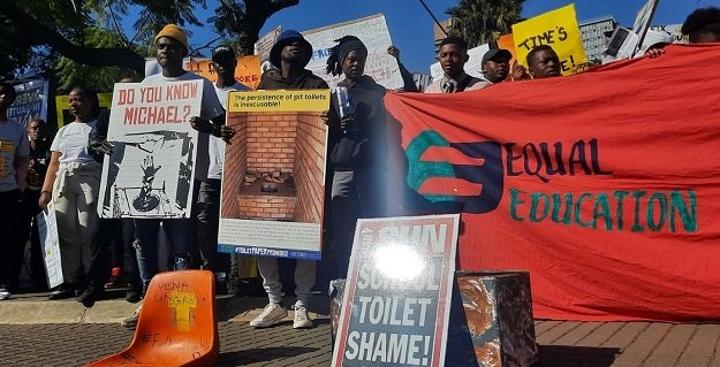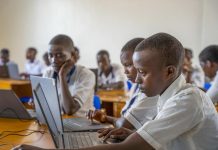Africa-Press – South-Africa. A group of Equal Education activists protested at the Department of Basic Education on Friday against plans to remove deadlines for infrastructure improvements at schools.
Similar protests have been held in the Eastern Cape and Western Cape in the last couple of weeks.
The protests follow Basic Education Minister Angie Motshekga putting the 2013 regulations for norms and standards for public school infrastructure up for public comment, which was originally opened until 10 July but this has been extended to 31 July.
The regulations and set deadlines came after a long legal battle between Equal Education and the education department which forced the government to commit to fixing infrastructure in schools. Immediate deadlines for infrastructure were set, including eradicating pit latrines in schools. The department failed to do this.
Zille tells supporters new education bill will discriminate against Afrikaans-speaking schools
In the current infrastructure amendments, asbestos and other unsuitable materials for buildings were supposed to be replaced by 2016. All schools should have had water, electricity and sanitation by 2020.
Now, the department wants to remove the deadlines for when the infrastructure should be fixed.
It said it scrapped the deadlines to make its targets more in line with the National Development Plan.
On Friday, a group of Equal Education activists gathered at the department’s offices demanding that the deadlines not be removed.
The organisation’s deputy general-secretary, Tebogo Tsesane, said removing the deadlines was just another way the department did not want to commit to fixing schools.
He added it had already missed the 2016 deadlines to ensure no schools had asbestos, adding schools were also not supposed to have pit latrines.
“This means that all schools that still have pit latrines are illegal,” Tsesane said.
“This is not a fight we are willing to lose. We need to speak to our communities and let them know about this submission.”
The demands the group presented to the department include that pit latrines be eradicated immediately as well as proper consultation with school governing bodies, teachers and pupils. They also ask for a meeting to be held by 29 November.
Group disrupts UCT exam session by pulling papers off students’ desks
Department spokesperson Elijah Mhlanga accepted the memorandum, saying it would be taken to the committee for all public comments.
Amnesty International accused the department of trying to evade accountability.
“The state has an obligation to respect, protect, promote and fulfill the right to basic education, a right which has been recognised by the Constitutional Court of South Africa as immediately realisable,” Amnesty International South Africa’s executive director, Shenilla Mohamed, said.
“The human rights of all learners to safety, dignity, and quality education must be centred and prioritised in all education laws and policies.”
The National Professional Teachers’ Organisation of South Africa (Naptosa) said it was also disappointed by the proposed amendments, adding Motshekga had published them without consulting teacher unions.
“This is clearly not the way to build and maintain a stakeholder relationship. When the department wishes to obtain Naptosa’s buy-in on a matter, for example the vaccination rollout process, they are quick to liaise with us, but when they foresee we might have a different view on a matter, they remain mum,” added Naptosa’s executive director, Basil Manuel.
He said the union was unhappy about the removal of the timeframes from the amended regulations, adding it was also worried the department wanted to change the reporting mechanisms for provincial departments.
“The current regulations identify specific areas that provincial departments need to annually report on as far as school infrastructure is concerned.
“The proposed amendments remove this and replace it with a provision requiring provincial departments to annually give a detailed report on plans and progress on the implementation of the norms.
“Without specifics to be addressed in such a report, it could become nothing more than an overview in general terms, hiding what is actually transpiring,” Manuel added.
For More News And Analysis About South-Africa Follow Africa-Press






